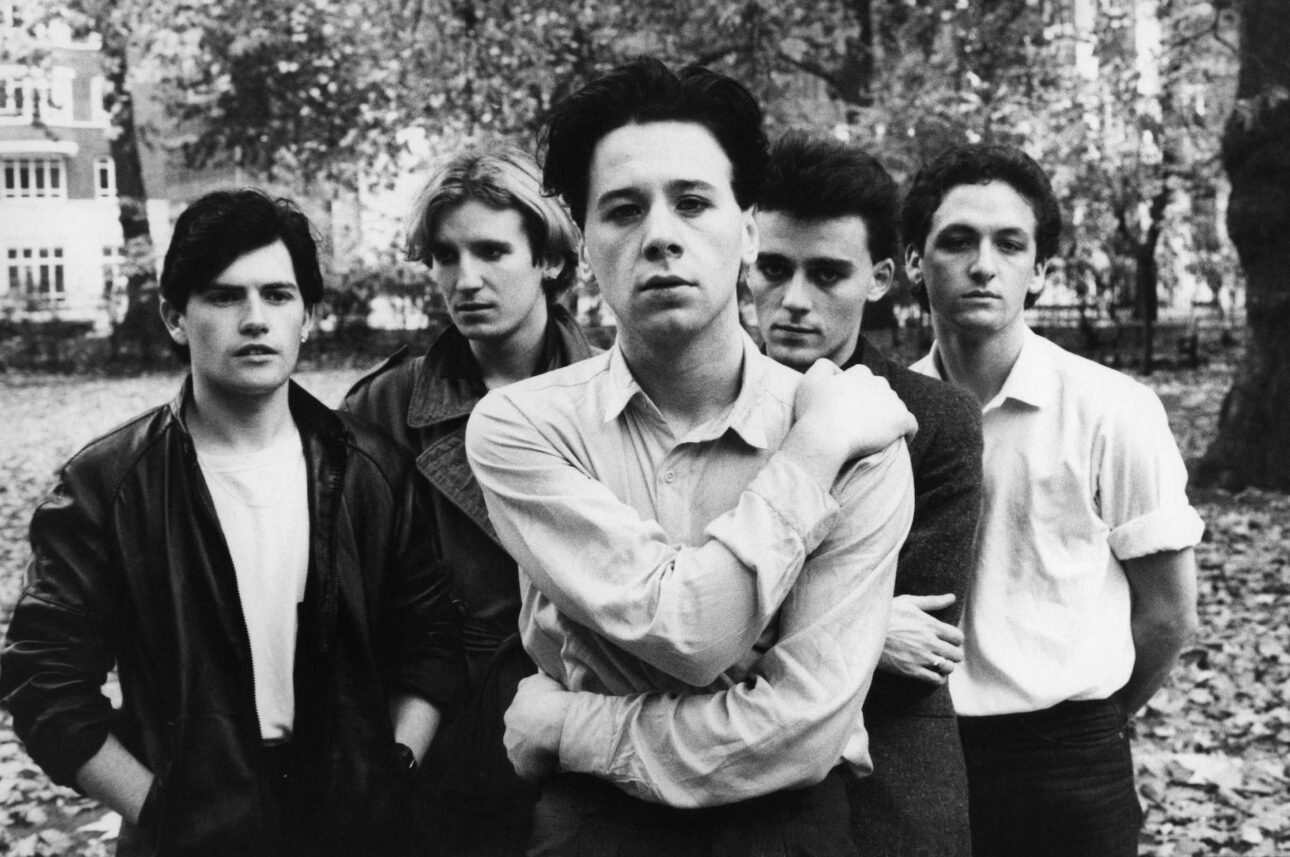When I am introduced to Charlie Burchill, Simple Minds’ guitarist, the first thing he asks me is, “Where are you from?” It’s a complicated question for me to answer, but it doesn’t surprise me that he’s curious about it. In an early scene of the Simple Minds documentary, Simple Minds: Everything is Possible (viewable in BBC iPlayer and receiving its theatrical release on June 13), Charlie’s musical other half, the group’s vocalist, Jim Kerr, is in a library in their hometown of Glasgow, Scotland. Jim shares how he was encouraged by his father to read, and how invariably, his choices veered toward titles that were about traveling to foreign lands.
A few minutes later, when I am introduced to Jim, he also immediately asks me where I am from. I proceed to give my complicated response, the middle part of which involves the years I lived in Iran after the Islamic Revolution. I leave out Simple Minds’ lifesaving impact on me during that time, which still continues. We have to know each other a little better before that reveal.
More from Spin:
- Reznor, Ross Celebrate Film/TV Score Favs With Future Ruins Fest
- Wilco Celebrates Mother’s Day in Chattanooga, Tennessee
- Hot as Hell, but Rilo Kiley Makes it Just Like Heaven

It doesn’t take long for me to feel like Jim and Charlie have absorbed me into their two-person ecosystem. Their friendship was established over half a century ago and has only become stronger with time. They followed each other to the municipality of Taormina in Sicily (the location of The White Lotus Season Two) where they set up residence. Jim owns a scenic boutique hotel in Taormina, Hotel Villa Angela, where its popularity makes getting a booking there difficult to secure. (I know, I tried.) I ask if they live near each other and Jim says, “Throw stones” as he mimes the action, then chuckles at the fact that after all these decades, he and Charlie are still attached at the hip.
Jim and Charlie have always had wanderlust. Even Jim’s owning a hotel is a key symbol of being on the move. “That’s a great word,” Jim says. “For some people, the world ends at the bottom of the street. For us, that’s where it begins.”
As soon as they were old enough, Jim and Charlie went hitchhiking. They found themselves at the Verona Arena, a Roman amphitheatre in Northern Italy where they slept in the archways. In 1989, Simple Minds played Verona Arena, and this summer, they will perform there again.
“One of the reasons the band is still attractive to us is it is escapist,” says Jim. “I don’t know what we’re leaving behind, or what we’re running away from, or towards, but that’s as much why we wanted to be in the band as the music.”
This year marks several milestones for Simple Minds, which, at this point only includes Jim and Charlie from the original lineup. There is the aforementioned documentary, the ruby anniversary of their landmark album, Once Upon a Time whose deluxe editions include “Don’t You (Forget About Me),” which they performed on Jimmy Kimmel Live earlier this evening. Plus, the extensive “Alive and Kicking Tour” with support from Soft Cell and Modern English, as well as a live double album released in April, Live in the City of Diamonds, recorded at Amsterdam’s Ziggo Dome during the group’s 2024 global tour.

A click through the tour section on Simple Minds’ site and it’s apparent the group have played live every year, pretty much, since their start. The number of tour dates have ramped up in recent years, with no fallow years. “Usually you take a break,” says Charlie, “But there is such a demand. It just seemed to grow. Last couple of years there has been a lot of touring. But it was great because it opened up a window where we could spend more time here [in the U.S.].”
Last year, Simple Minds dominated the Southern California festival Cruel World, which took them by surprise. “We’ve got fans and college radio was really good to us back in the day, but I couldn’t believe it when we turned up there,” Jim recalls. “There were a lot of acts on. I thought once we start playing, because I’m confident of the band, people will come from the other stages. Forty-five minutes before we went on, people were waiting as far as I could see.”
This year, Simple Minds’ North American tour kicks off May 16 and goes for five weeks. “It’s blown our minds that we’re getting a chance to come back to work, and so extensively,” Jim admits. “We didn’t work as hard as we could in America, or as hard as we should have, and we regretted that. We didn’t think we’d get a chance again. We’re getting a bit of a chance now. We know what we’re doing live, and we’ve got to do it for a lot more people.”
Since their inception in the late 1970s, Simple Minds have released almost 20 studio albums, with less than a handful of years between each one. There was an ongoing evolution in the group’s sound, especially over the course of the first few albums from post punk and new wave to stadium-ready songs.
“The year before punk rock, the idea that you would dare to form a band or start your own fashion label or do your own documentary or do your own fanzine, you just didn’t do that,” says Jim. “But suddenly this punk came along with the homemade ethic. Anyone could give it a go. For about six months, we were in this punk band. It was a pretty lousy attempt. We knew that wasn’t right. But at the heart, there’s something that works. We’ve gone to the same pubs and the same clubs and people didn’t go crazy. But when we played, people would go crazy. That was the oxygen.”

“The diversity of music in the ’80s, a lot of color and imagination,” says Charlie. “No fear of melody.”
It wasn’t until their fourth double album, Sons & Fascination/Sister Feelings Calls, that Simple Minds made any significant inroads outside of the U.K. In the U.S., the group became household names in 1985 with “Don’t You (Forget About Me)” from the teen classic movie The Breakfast Club. It was a No. 1 hit for the group, and the song they are best known for. The group’s resistance to recording the song, which was not written by them, is the stuff of legend as laid out in SPIN’s oral history of the song.
“Sometimes it comes across that we’re ungrateful at the opportunity that the song gave us,” says Jim (who still hasn’t seen The Breakfast Club outside of a rough cut, nor has Charlie). “We felt guilty about the success of it. It took three hours to do. Let’s just do it. Record company will get off our back. It’ll be a B-side or a bonus track or something.”
In my experience with high school students, if there is ever a chance for them to watch a film, their first choice is, invariably, The Breakfast Club—even 40 years later. I tell Jim and Charlie this and confirm that it is, in fact, a good movie. But if they relent and watch it, then they wouldn’t be able to say that they’ve never seen the final version, which is kind of gangster.
Once Upon a Time, the album on which “Don’t You (Forget About Me)” appears, cracked the top 10 in the U.S. When Simple Minds perform the song on Jimmy Kimmel Live, the multigenerational, multicultural crowd instantly sings along when Jim points the microphone in their direction. The song ignited Simple Minds’ career stateside. The three subsequent singles from Once Upon a Time all landed in the top 30.
It’s not these chart and commercial achievements from which Jim gets his confidence, which he has in abundance, and he is comfortable owning it and he acknowledges that. “What I am above anything else is an enthusiast,” Jim explains one of the sources of his confidence. “Because I’m not a musician and never wanted to be one, it’s all magic to me. But I know when I feel it. There is a certainty that comes with it. It’s a humbling feeling. I was more confident than the guys. They were still working it out, but the hair at the back of my neck would be standing up. If I feel it, they’re going to get it.

About the other source of his confidence he adds, “Every time we played, people would go crazy. I wish everybody could, even once, feel as we get to feel, even before we play a note. You would feel 10 feet taller. As soon as the gig is over, you turn into a shrinking guy. But when you’re up there, pumped up and the music is doing it all for you. Everything changes.”
My growing up experience could not be more different from Jim’s and Charlie’s. When their first album was released in 1979, the Islamic Revolution has taken its firm hold on Iran where I was living at the time. Three years later was when I heard, and saw, my first Simple Minds song, “Promised You a Miracle,” from New Gold Dream (81, 82, 83, 84), taped off Top of the Pops on a bootleg Betamax. It’s electropop deliciousness resonated strongly with me and Simple Minds were added to my collection of musical lifelines.
At this point in our conversation, I feel comfortable sharing this with Jim and Charlie. From Everything is Possible, I saw how and where they grew up, in “post-industrial wasteland” Glasgow, in tower blocks. This is far removed from the privileged mix of Western sensibilities and Middle Eastern traditions with which I grew up. But we have the library in common, as well as reading, music, traveling, and supportive parents.
Jim tells me a great saying of his mother’s: “You’re not better than anyone else, but nobody’s better than you.” And he recounts the first time he heard the Doors, and how he felt hearing Jim Morrison’s voice speaking from a distant California. “I remember being transfixed and feeling that connection with this other Jim from so far away.”
“I was in Bangkok, sitting in a restaurant with three 20-year-old Chinese guys,” Charlie shares. “One of them decided to chat to me to practice his English. When I said I was from Glasgow. He said, ‘Our favorite bands are from Glasgow: Mogwai, Texas,’ and one of the other guys says, ‘Simple Minds.’ I asked him what his favorite album was and he said, ‘Street Fighting Years.’ I asked my manager, who’s been to China, ‘Why would these 20-year-old Chinese guys be interested in an album we did in 1989?’ and he said that was the first year that China was closed.”
There are many insights like these in Everything is Possible. The Simple Minds stories have been told for almost 50 years, but it’s different seeing it put together in this way. The cultural context is invaluable. The input from the likes of Bob Geldof, Depeche Mode’s Dave Gahan, Primal Scream’s Bobby Gillespie, Trainspotting author Irvine Welsh, as well as music industry icons Richard Branson, Jimmy Iovine, managers, producers, and radio presenters, gives the Simple Minds story even more perspective. The best parts, however, are when the film follows Jim and Charlie around. It’s heartwarming to see Charlie visiting a guitar shop in Glasgow. It’s a delight to hear Jim speaking to a local restaurateur in Taormina, in flawless Italian.
“We weren’t really interested in ourselves,” says Jim. “We went through things without trying to analyze them. But recently we’ve been asking, ‘Why did we do that? What was the real thinking? What was the explanation?’ There wasn’t a plan. It wasn’t a strategy. We were just living it, 24 hours a day, nothing else in our lives, at least for the first 10 years. If we didn’t do a documentary, someone else would do it. We’ve got no intention of stopping working, but we’re tidying things up.”
To see our running list of the top 100 greatest rock stars of all time, click here.



